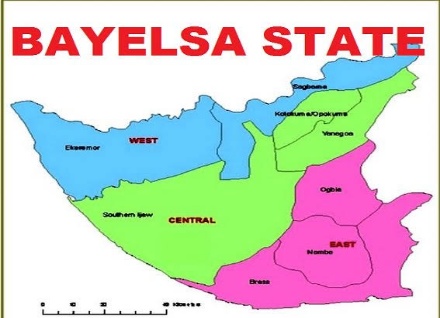Business
CBN Vows To Penalize Shipping Lines Over Undocumented Exports
Published
1 year agoon
By
Editor
The Central Bank of Nigeria (CBN) has threatened to penalize shipping companies exporting undocumented cargoes from the country.
CBN Governor, Godwin Emefiele said this today while speaking at the RT200 Non-Oil Export Summit 2023 in Abuja.
The theme of the summit is “RT200: Challenges and Prospects”.
Emefiele said the development of the non-oil export sector is crucial given that it holds vast potential for generating a significant amount of foreign exchange earnings.
He said the CBN regularly monitors and appeals to exporters to document their exports and repatriate proceeds so it can be utilized optimally for the benefit of the country’s economy.
READ ALSO: CBN To Sanction Banks Harbouring Unlicensed Firms
He, however, said the apex bank was aware that some people try as much as possible to sidetrack the process by attempting to export their cargo without documentation.
“About three years ago, I had a meeting at the Central Bank of Nigeria in Lagos with the shipping lines. I had said the central bank will be beaming some satellites on undocumented exports.
“We had advised the shipping lines at that meeting that we will also be monitoring and if we find that they export cargo without documentation that we will penalize them including placing their accounts on post-no-debit (PND).
“We have so far not done anything like that just because we feel that the shipping lines will be responsible to do what is right. But, if we do not see the kind of cooperation that we expect, I’d have to insist that we do what we need to do,” he said.
READ ALSO: CBN To Roll Out Guidelines On Contactless Payment System
Speaking on the success of the RT 200, the CBN Governor said earnings from non-oil exports increased by 40 percent from $3 billion in 2021 to $5.6 billion at the end of 2022.
The RT200FX programme was introduced to stimulate non-oil exports with a $200 billion FX income target in the next three to five years.
“Today, I am happy to note that the RTX 200 programme has led to tremendous progress in export proceeds repatriation since its establishment in February 2022.
“In February of 2022 and March, it was only N62 million. By the second quarter, which was April to June, it had risen to about 600 million. By the third quarter, (July to August or September), it had risen to over 900 million.
READ ALSO: CBN Closes 31 Banks In Lagos, 72 Microfinance Banks Nationwide
“Available data shows that repatriation due to the programme increased by 40% from $3 billion in 2021 to $5.6 billion at the end of 2022.
“The momentum for 2023 is equally issuing strong numbers and impressive prospects. In the first quarter of 2023, a total of $1.7 billion was repatriated to the economy, while about $970 million was sold into the I&E window,” Emefiele added.
You may like
Business
CAC Opens Centre For Registration Of PoS Operators
Published
4 days agoon
May 9, 2024By
Editor
The Corporate Affairs Commission has inaugurated a centre for bulk registration of Point of Sale operators in its database.
The CAC Registrar-General, Hussaini Magaji, said this while inaugurating the centre stationed at its Federal Capital Territory Office in Abuja on Wednesday.
According to Magaji, the importance of registering the PoS operators in the commission’s database cannot be over emphasised.
He said the centre was well equipped with all the necessary facilities to operate 24 hours a day and ensure the commission’s achievement of its purpose.
READ ALSO: ICYMI: FG To Delist Naira From P2P Platforms
“What we did was accommodate the request from the Fintechs.
“We have allowed them to integrate with the Corporate Affairs Commission; they have developed their structure, and we gave them access.
“Once they supply the necessary details for registration on their platform, the certificate is generally generated and transmitted directly to their platform without them having to contact anyone.
“We have done this to ensure that everyone gets it easy without hitches, but if they choose to apply manually, we have a secretariat open for them to do so,” he stated.
READ ALSO: ICYMI: FG Gives Deadline To PoS Operators To Register With CAC
Recall that the Federal Government through the CAC on Tuesday issued a two-month registration deadline to Point of Sales companies, to register their agents, merchants, and individuals with the commission in line with legal requirements and the directives of the Central Bank of Nigeria.
Meanwhile, at the event, the registrar-general reiterated that the centre would be opened to all operators in the fintech industry who voluntarily submitted their agents and merchants for regularisation with the CAC.
Magaji said that the registration was in line with President Bola Tinubu’s desire to ensure financial inclusion for the youth and strengthen the fight against fraud, finance and other crimes in the country.
He further expressed his resolve to ensure compliance with the provisions of Section 863 (1) of the Companies and Allied Matters, CAMA 2020, and the CBN guidelines for Agent Banking, 2013.
READ ALSO: ICYMI: Five Things To Know About The New Cybersecurity Levy To Be Paid By Nigerians
On security, the CAC boss said that if a crime were committed using the PoS, the government would easily trace the perpetrators to the CAC data platform if such machines were registered.
“If an incident happens and they report it to CAC, if we do not have the operator’s details, we cannot respond, and that is the essence of this registration.
“The registration ensures that every detail of the person is provided, including NIN, passport photograph and all other useful documents.
“And it is an opportunity for more people to be captured into the formal sector,” he said.
The News Agency of Nigeria reports that the Special Adviser to the President on ICT Development and Innovation, Tokoni Peter attended the event.
The event was attended by Dr Salihu Dasuki, the Special Adviser to the President on ICT Policy Office, the PoS operators, and other stakeholders.
(NAN)
Business
FULL LIST: CBN Publishes List Of Licensed Deposit Money Banks
Published
4 days agoon
May 8, 2024By
Editor
The Central Bank of Nigeria has released a comprehensive list of licensed Deposit Money Banks operating within the country.
The list, which was made public on the CBN’s official website on Tuesday, provides insights into the banking landscape in Nigeria.
Banks with international authorisation include Access Bank Limited, Fidelity Bank Plc, First City Monument Bank Limited, First Bank Nigeria Limited, Guaranty Trust Bank Limited, United Bank of Africa Plc, and Zenith Bank Plc.
READ ALSO: BDC Operators Arrested As Naira Sells 1,416/$
Commercial banks with national authorisation include Citibank Nigeria Limited, Ecobank Nigeria Limited, Heritage Bank Plc, Globus Bank Limited, Keystone Bank Limited, Polaris Bank Limited, Stanbic IBTC Bank Limited, Standard Chartered Bank Limited, Sterling Bank Limited, Titan Trust Bank Limited, Union Bank of Nigeria Plc, Unity Bank Plc, Wema Bank Plc, Premium Trust Bank Limited and Optimus Bank Limited.
Commercial banks with regional licenses are Providus Bank Limited, Parallex Bank Limited, Suntrust Bank Nigeria Limited, and Signature Bank Limited.
Players in the non-interest banking sector with national authorisation include Jaiz Bank Plc, Taj Bank Limited, Lotus Bank Limited, and Alternative Bank Limited.
READ ALSO: [ICYMI]FULL LIST: 16 Banking Transactions Exempted From CBN’s New
In the merchant banking category, the apex banks listed, are Coronation Merchant Bank Limited, FBN Merchant Bank Limited, FSDH Merchant Bank Limited, Greenwich Merchant Bank Limited, Nova Merchant Bank Limited, and Rand Merchant Bank Limited.
The financial holding companies listed were Access Holdings Plc, FBN Holdings Plc, FCMB Group Plc, FSDH Holding Company Limited, Guaranty Trust Holding Company Plc, Stanbic IBTC Holdings Plc, and Sterling Financial Holdings Limited.
The Mauritius Commercial Bank Representative Office (Nigeria) Limited was listed as the sole representative office.
Business
[ICYMI]FULL LIST: 16 Banking Transactions Exempted From CBN’s New
Published
6 days agoon
May 7, 2024By
Editor
The Central Bank of Nigeria on Monday directed all banks to commence charging a 0.5 per cent cybersecurity levy on all electronic transactions within the country.
The apex bank stated this in a circular signed by the Director, Payments System Management Department, Chibuzo Efobi; and the Director, Financial Policy and Regulation Department, Haruna Mustafa; a copy of which was obtained by The PUNCH.
The circular, which was directed to all commercial, merchant, non-interest, and payment service banks, among others; noted that the implementation of the levy would start two weeks from Monday, May 6, 2024.
READ ALSO: Five Things To Know About The New Cybersecurity Levy To Be Paid By Nigerians
“The levy shall be applied at the point of electronic transfer origination, then deducted and remitted by the financial institution. The deducted amount shall be reflected in the customer’s account with the narration, ‘Cybersecurity Levy,’” the circular partly read.
In this piece, The PUNCH highlights all the 16 banking transactions that are exempted from the CBN’s new cybersecurity levy:
Loan disbursements and repayments
Salary payments
Intra-account transfers within the same bank or between different banks for the same customer
Intra-bank transfers between customers of the same bank
Other Financial Institutions instructions to their correspondent banks
Interbank placements,
Banks’ transfers to CBN and vice-versa
Inter-branch transfers within a bank
Cheque clearing and settlements
Letters of Credits
READ ALSO: FG To Delist Naira From P2P Platforms
Banks’ recapitalisation-related funding – only bulk funds movement from collection accounts
Savings and deposits, including transactions involving long-term investments such as Treasury Bills, Bonds, and Commercial Papers.
Government Social Welfare Programmes transactions e.g. Pension payments
Non-profit and charitable transactions, including donations to registered non-profit organisations or charities
Educational institutions’ transactions, including tuition payments and other transactions involving schools, universities, or other educational institutions
Transactions involving bank’s internal accounts such as suspense accounts, clearing accounts, profit and loss accounts, inter-branch accounts, reserve accounts, nostro and vostro accounts, and escrow accounts.

American Comedian, James Gregory Is Dead

Rivers Crisis: Pro-Fubara Assembly To Screen Commissioner-nominee On Monday

Truck Crushes Five-year-old Girl In Lagos
Trending

 News4 days ago
News4 days agoThe New Masquerade’ Actress, Ovularia Is Dead

 News4 days ago
News4 days agoBREAKING: Rivers State House Of Assembly Gets New Speaker

 Business4 days ago
Business4 days agoFULL LIST: CBN Publishes List Of Licensed Deposit Money Banks

 Metro4 days ago
Metro4 days agoEdo: Police Patrol Van Pursuing ‘Yahoo Boys’ Rams Into Motorcycle Convening Passenger

 News4 days ago
News4 days agoFather Of 12 Found Dead Inside Brothel In Bayelsa

 Politics1 day ago
Politics1 day agoRivers Crisis: Why Gov Fubura Got Into ‘Trouble’ – Secondus

 News3 days ago
News3 days agoVIDEO: Nigerian Man Exhumed After Completing 24-hour Buried Alive Challenge

 Metro1 day ago
Metro1 day agoKogi University Lecturer Stripped Over Alleged Sexual Harassment

 News4 days ago
News4 days agoNigerian’s Request To Be Buried Alive For 24 Hours Causes Stir Online [VIDEO]

 News4 days ago
News4 days agoNigerian Emerges First Black Woman To Bag PhD In Robotics At Michigan Varsity





















